Gentlemen’s Guide: Bangkok’s 5 Best Barber Shops
These top 5 barber shops in Bangkok are where gentlemen can elevate ...
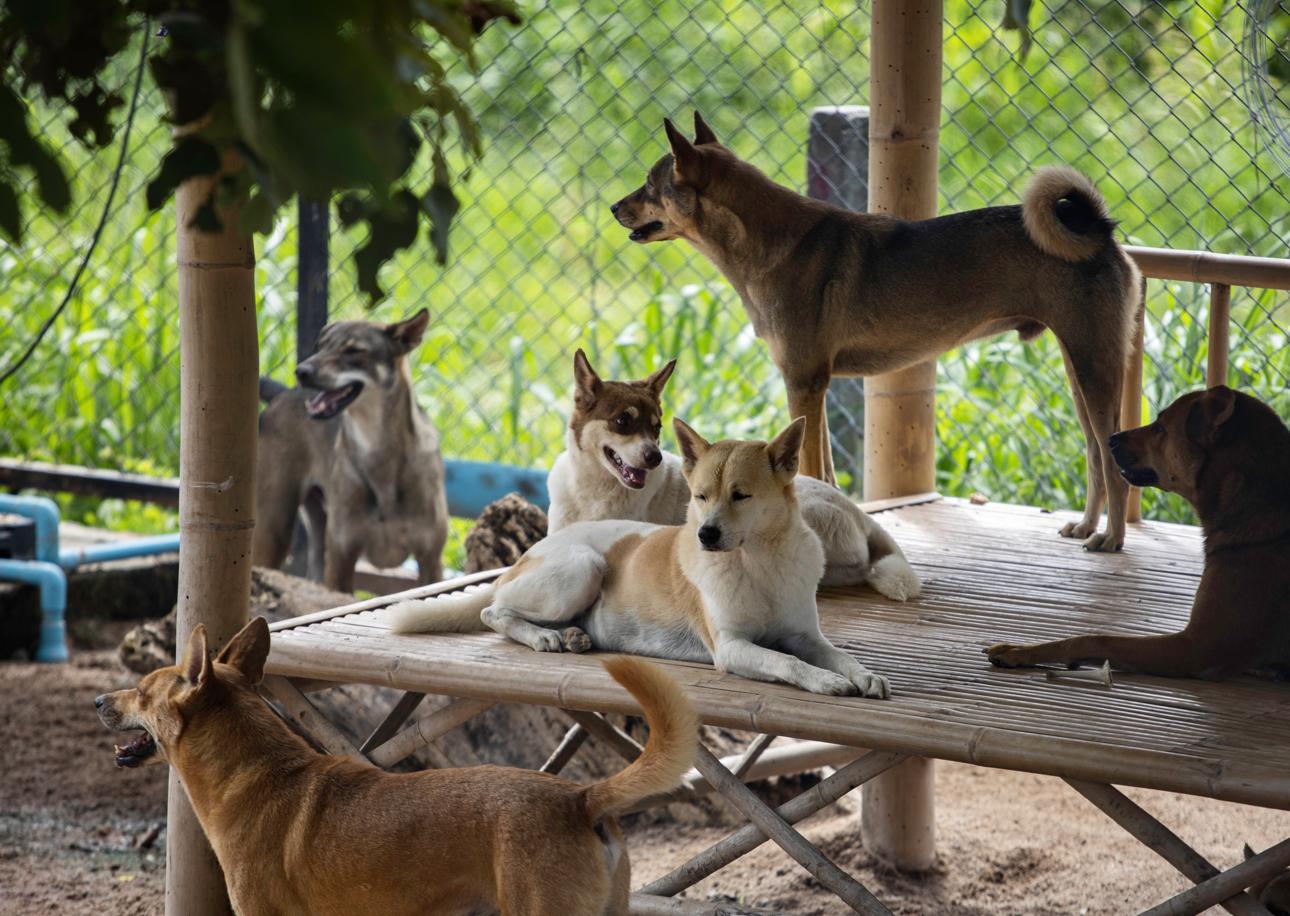
[This story originally appeared in Koktail Magazine issue 2.]
Everybody enjoys a good rescue story. We cheer when the person in danger is swept out of the clutches of a villain. We follow dramatic stories of separation unfold on the news and sit on the edge of our seats in the cinema, hoping for the characters’ safety and triumph. But what if those in need of rescue have four instead of only two legs?
Animals have been rescuing humans since the beginning of time, and there are extraordinary people in Thailand who are going to great lengths to repay that favour. In this story, we shine the light on the good deeds done by some of these heroes for the homeless dogs of Thailand.
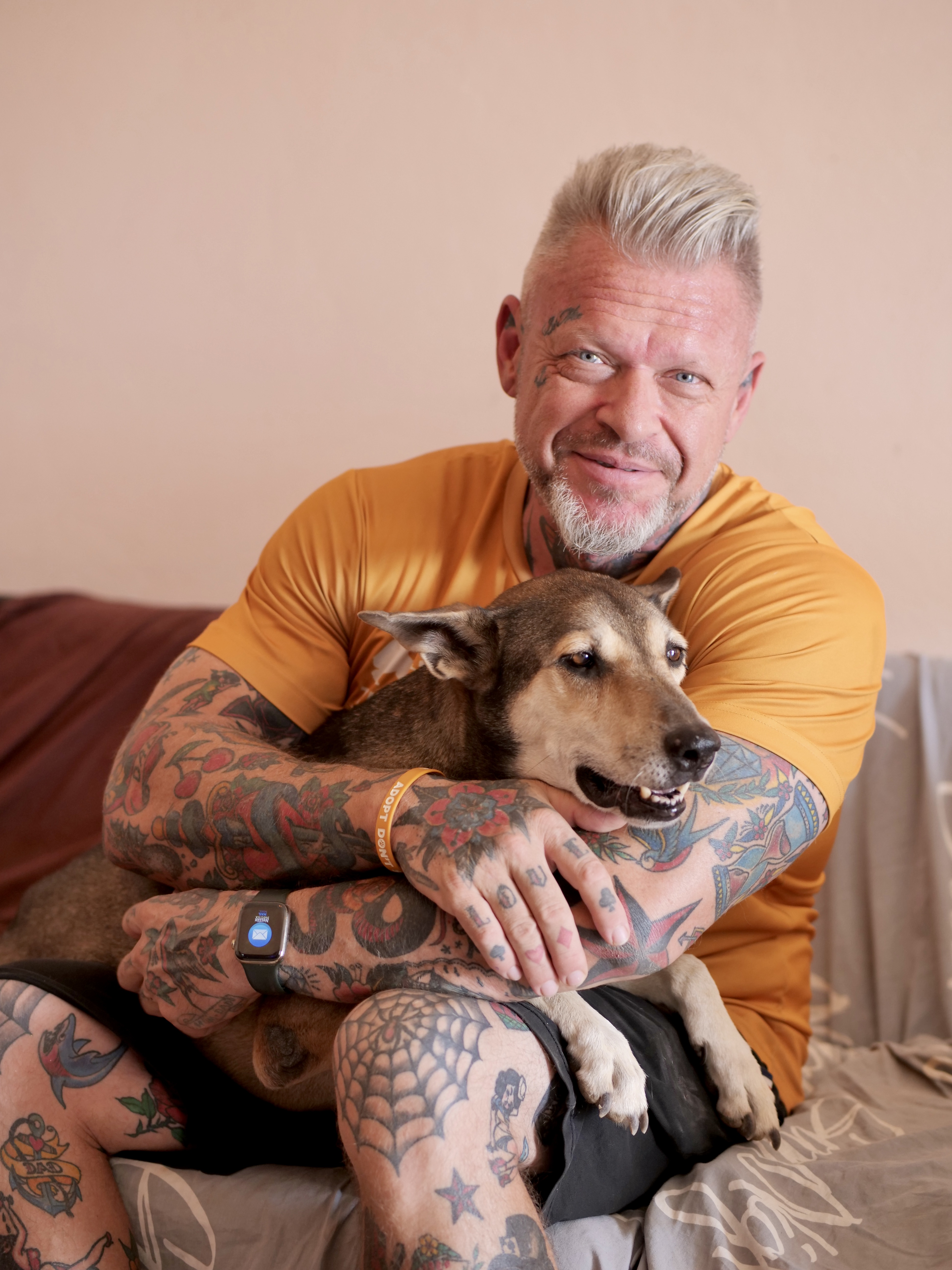
I had the opportunity to sit down with Michael Baines over a virtual cup of coffee as he was kind enough to take time out of his busy schedule to talk about The Man That Rescues Dog, his sanctuary. Abbreviated as TMTRD, it opened in 2017 and is currently sheltering around 670 rescued dogs while monitoring and feeding an additional 350 in the Bangsaen and Sriracha areas. Located about an hour from Bangkok, this dog sanctuary is famed for its size. At approximately 7,000 square metres, TMTRD features a full-service clinic; a care centre for disabled dogs; a sterile quarantine section for new rescues and dogs with serious diseases; a specialised distemper unit; three swimming pools for water therapy and exercise; and five main shelters, with plenty of space for play and rest. Impressed? So was I, especially after learning that none of this was in Michael’s initial game plan when he moved here over 20 years ago.
The Scottish-born Baines moved to Thailand from Sweden because he wanted a change. A chef by profession, Michael has managed a number of restaurants, and one particular restaurant in Chonburi was where this rescue story began. “I didn’t pay much attention to stray dogs because they’re part of the culture here,” he said. “But one day in 2011, I happened upon a dog in very bad shape behind my restaurant.” Michael fed the stray dog every day until a video of him went viral on social media in 2016. In May of the same year, Michael decided to rent a house, hire staff and take in more dogs, but he was evicted. He posted about it online and, in 2017, he took over the local dog pound in the municipality’s area and expanded it.
Perhaps one of the most inspiring parts of TMTRD today is the group of 29 dogs attached to wheels that support their disabled hind legs, all of whom wag their tails to a chorus of barks as they race together during their daily walk at the sanctuary. Aptly called “The Wheelchair Mafia”, they enjoy a life of full bellies, walks and affection by all the staff at TMTRD. “Having a disabled dog isn’t a big deal. The only thing you have to do is empty their bladder four times a day and place them in a wheelchair when they walk. Otherwise, they’re all just dogs who bark and play like any other dog,” explained Michael.
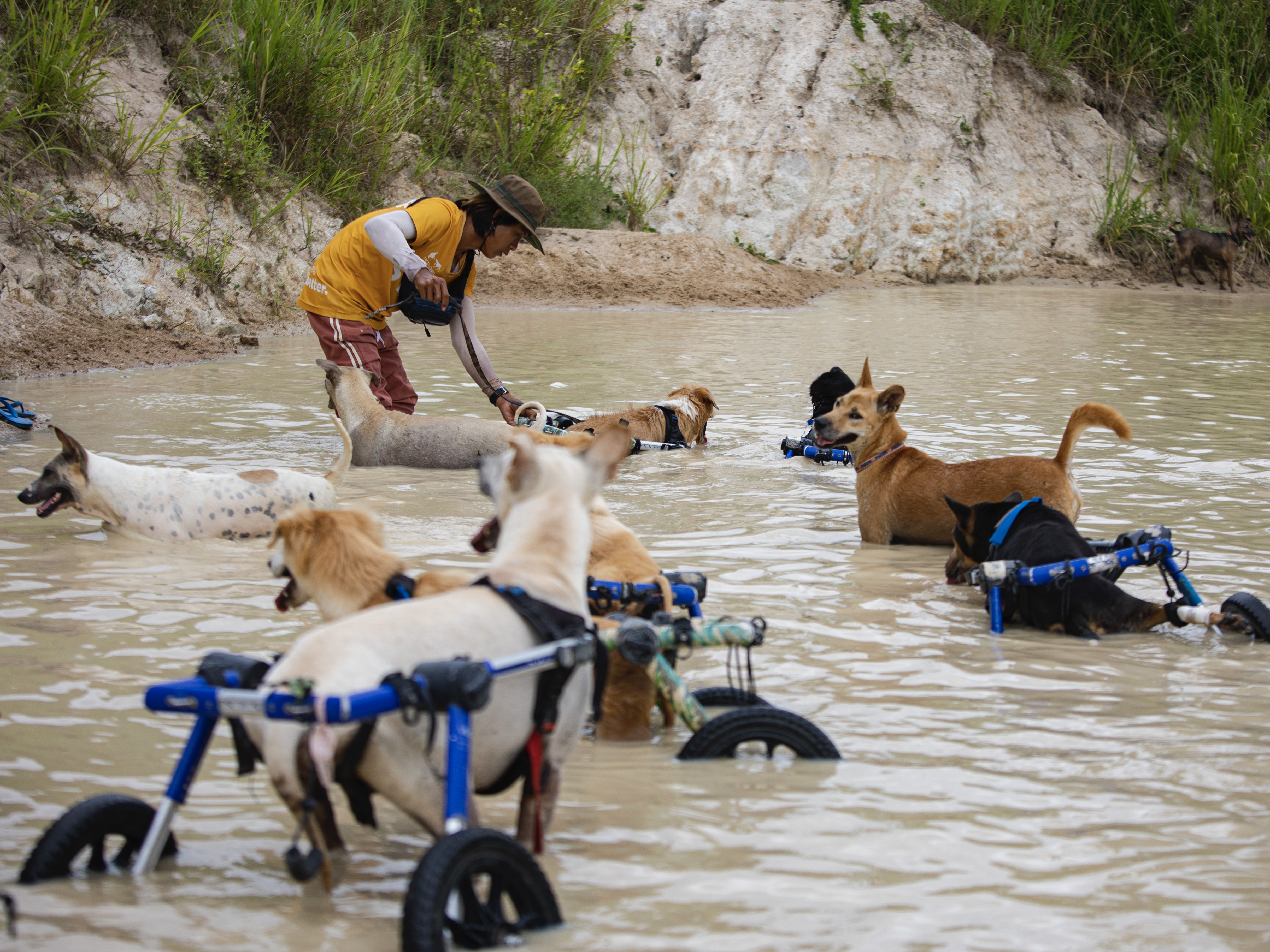
When asked why the clinic is free, Michael responded, “For us, it costs 50 baht for the raw materials to treat a dog initially. If we don’t offer the free clinic, dogs tend to get more sick, which ultimately leads to expensive treatment and maybe even a blood transfusion, all of which could have been avoided if the dogs were treated early on.”
To take care of 1,000 dogs daily, the sanctuary relies on private donations and employs 30 staff. “I love dogs, otherwise, I wouldn’t be doing this. This is my calling, my ikigai, and I must fulfil it,” said Michael. “But if you can’t guarantee that you’ll get donations, you’re not the right person for the job, and you should delegate it to someone who knows how to run a business. If you don’t, it will fail and the dogs will suffer.”
All of the dogs under TMTRD’s care are up for adoption locally in Thailand, and those interested must go through a strict interview process before the dogs are sent off to their forever homes.
To donate or adopt, click here.

Iza Mirzakhanian, Kirsty Smith and Brigette Persson hail from different parts of the world, but they all found themselves in Thailand one way or another, helping the nation’s strays, one pooch at a time. The three women met after running in the same circles and through the active “Bangkok Pet Lovers” Facebook page, which was managed by Kristy and Iza. From small beginnings, they pursued the idea to take their efforts to next level, and so The Adoptable Puppy Cafe in Bangkok was born.
The Adoptable Puppy Cafe is where Iza, Kirsty and Brigette’s individual rescue cases can meet their potential forever families through social media and pop-up events. “The Adoptable Puppy Cafe has helped scruffy-looking puppies from the streets to be re-homed,” explained Brigitte, who runs Hin Lek Fai Rescue animal shelter in Hua Hin. “There’s a limit to how many dogs we can bring to our shelter,” said Brigitte. “A shelter isn’t a place where dogs should be if they can be in a loving home instead.”
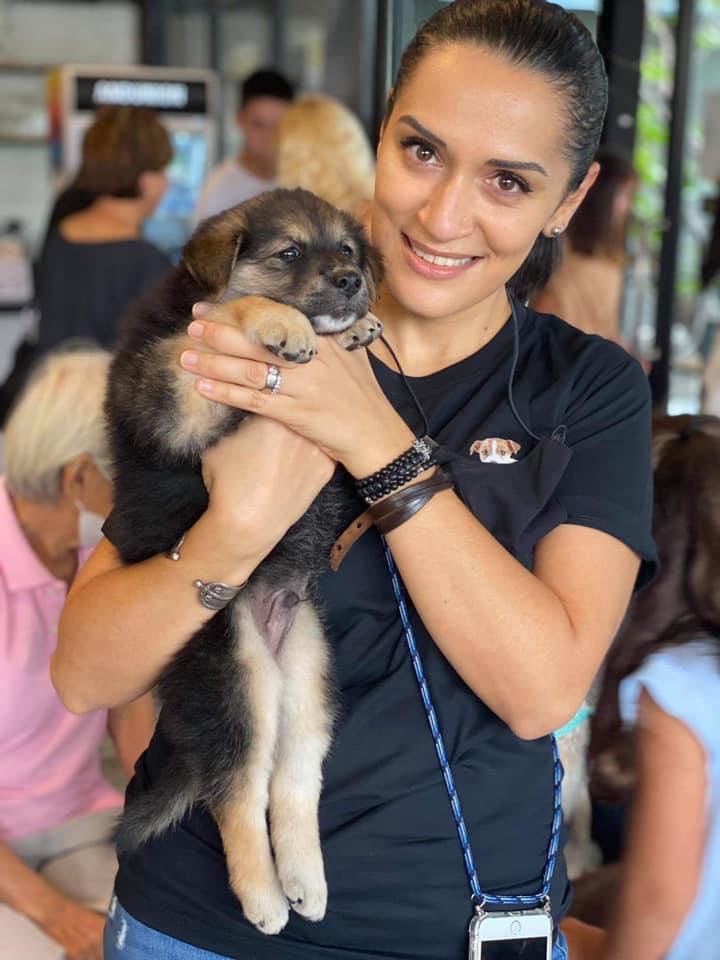
The Adoptable Puppy Cafe gives dogs this chance at a better life. Talking about her peers, Brigette told us that when Iza and Kirsty have finished helping a pup, it is always unrecognisable—in the best way. “We’re grateful for their help as many dogs would have died on the streets without them,” said Brigette.
Iza, who is Bangkok-based, believes it is possible to change people’s minds about the way they see street dogs. Realising that not everyone is keen on taking in a puppy, there is something we can all do to help the stray dogs of Thailand, from changing our perspective of street dogs to taking the responsibility of helping an injured animal when we come across one. “There are lots of people, pages, groups and resources out there that can help you. It’s not as hard as you may think,” Iza urged.
It’s safe to say that this pursuit is not for everyone. It can be emotionally draining and heartbreaking, but it does come with its rewards. When asked about whether they thought that rescuing dogs was their calling, Iza, Kirsty and Brigitte agreed.
“It gives me unmeasurable joy helping animals, seeing them go to loving homes and seeing them go from shy and scared to social, loving and trusting dogs,” Iza explained. “I’m now convinced this is what I was meant to do all along. I know I can’t save them all, but I will save every single one that crosses my path. Sometimes it takes years to find your ikigai. But once you do, life is never the same again.”
To donate or adopt, click here.
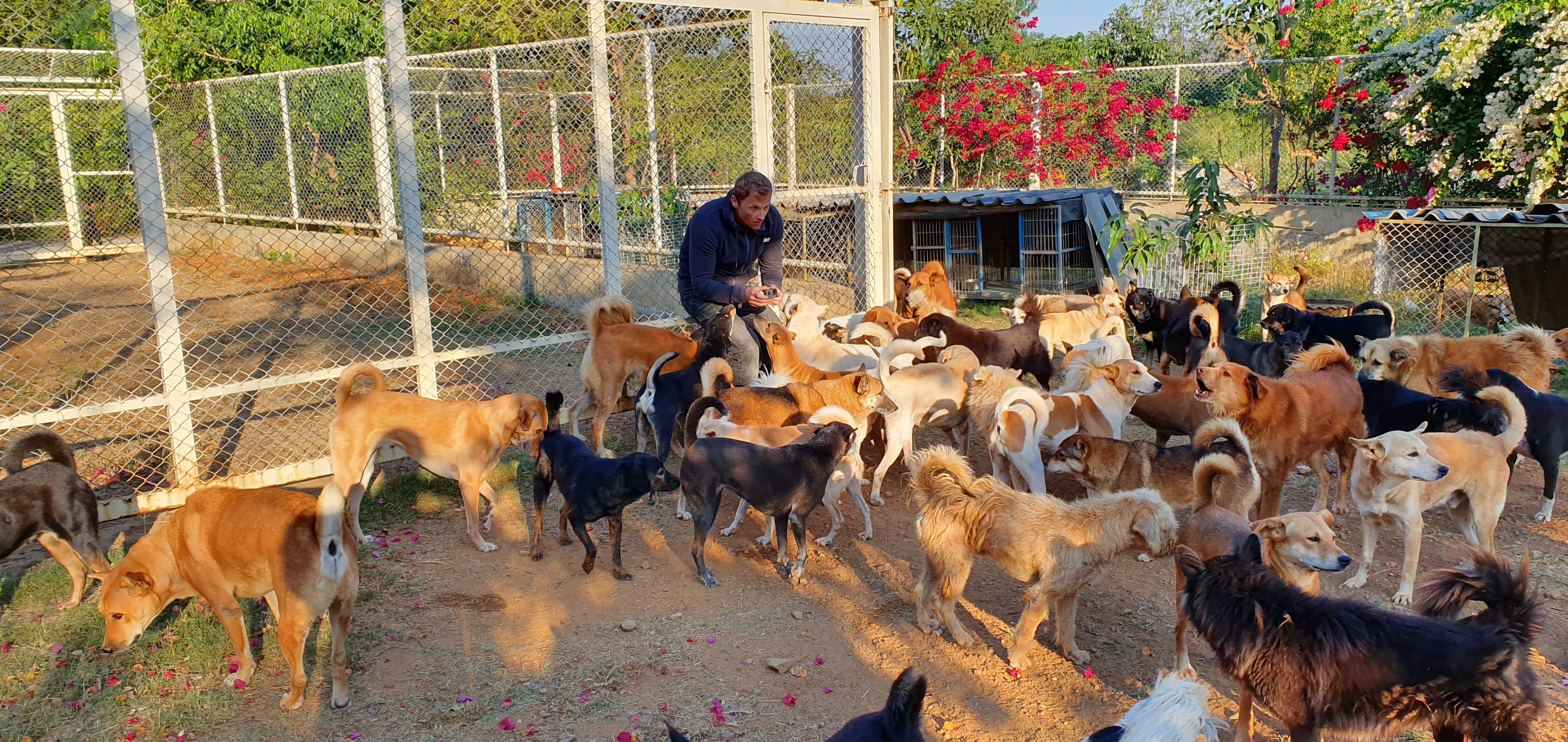
Almost 20 years ago, Anunthorn Vinijtaopatom’s mother, Kawiporn, brought home their first family pet: a small Shih Tzu puppy. A year later, the family had adopted nine more. The love Kawiporn had for her dogs was unmistakable, and it opened her eyes to the number of stray dogs in need of support in Nonthaburi and Bangkok. She started feeding as many as she could, taking injured and sick dogs to the vet and nursing others back to health. However, once they were healthy again, she’d send them back to the same location she found them. It wasn’t until she discovered the lifeless body of one of the dogs returned to the streets that she started bringing stray dogs (and cats) into her home.
Fast forward 17 years later, the entire family now looks after 1,700 dogs and cats at their Compassionate House for Stray Animals in Thailand (CHSAThai) sanctuary, located in Saraburi, north of Bangkok. Having had the opportunity to speak with Anunthorn—also known by the nickname Tape—about his family’s shelter, I learned that he slowly grew to love both dogs and cats through years of witnessing his mother’s dedication to them. “They are all my babies and members of my family,” Tape said about the animals under CHSAThai. “I love and care about every one of them.”
Tape started working on the sanctuary’s social media pages around 10 years ago, while he was in university, to help raise funds for the family’s shelter. By the time he graduated, the shelter had close to 1,500 animals under its care, which was when the financial woes began. This led to Tape dedicating himself full-time to working for the shelter. “It was my destiny,” he said.
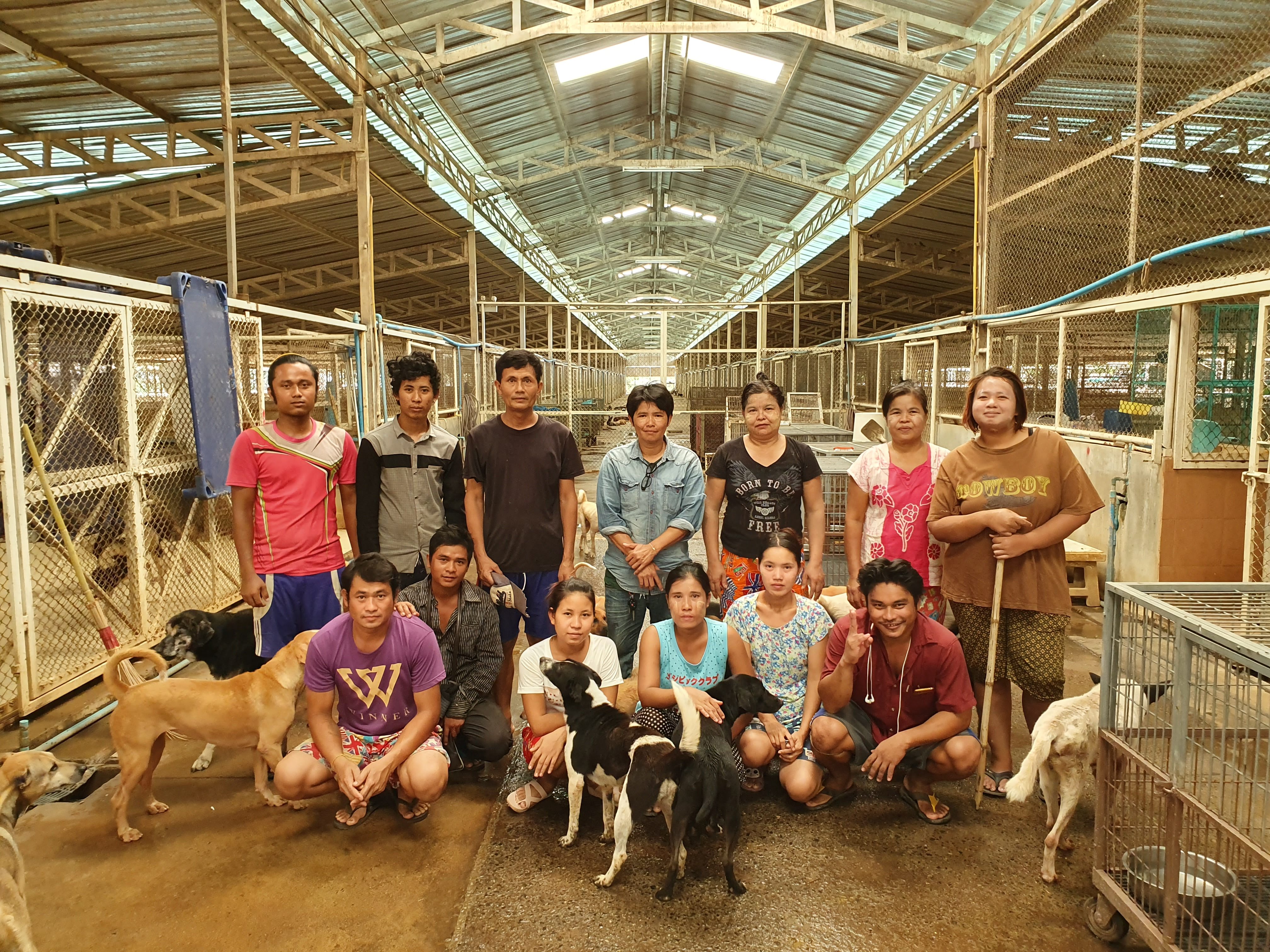
Despite the constant difficulties of fundraising and taking care of the animals, CHSAThai and Tape has had validation of their hard work. Tape shares that the shelter attracted the attention of His Majesty the King of Thailand, who donated animal food and medicine on many occasions.
While the stray dog situation in Thailand is dire and many people seem to abandon or intentionally poison them, Tape believes that there are still a few good people who do as much as they can to help the animals, from feeding them and taking them to the vet to assisting with sterilisation. This, however, is hardly enough if we want to make a difference. He explained, “The stray animals in Thailand need your help. Thailand has huge a stray animal problem that will keep increasing if people keep abandoning their animals.”
To donate, click here.
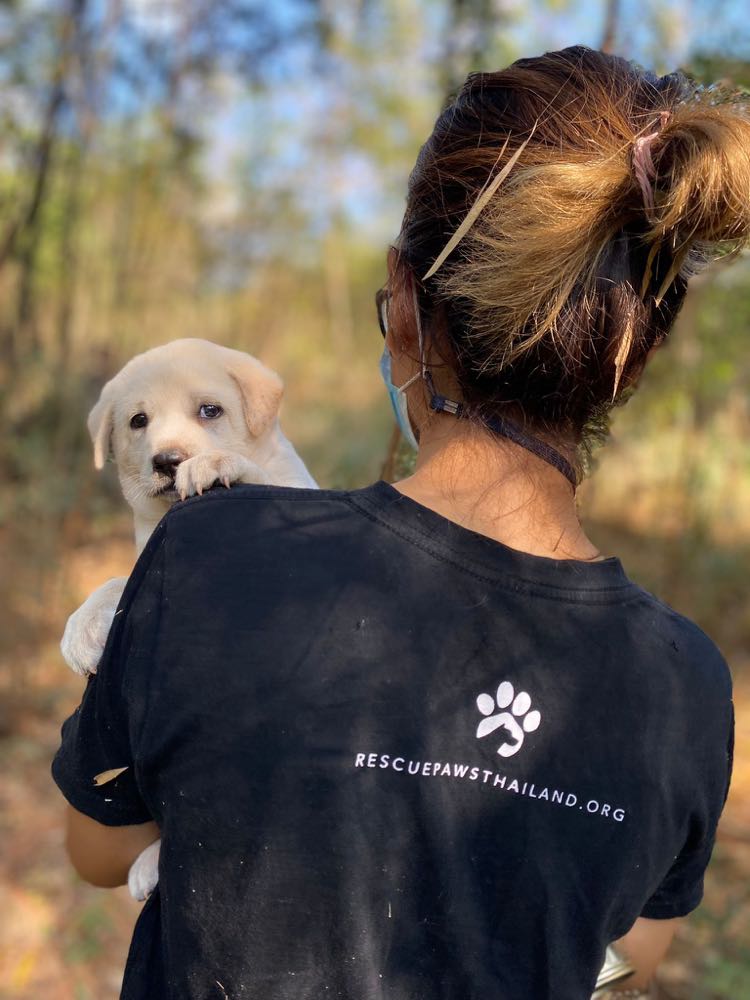
Jacob Thomas is the manager of the foundation called Rescue Paws. Having adopted a puppy from them myself, I talked to him about how the foundation came about and what it has achieved so far.
“Rescue PAWS started back in 2013 as a result of a few people noticing how many stray dogs there were in Hua Hin,” he began. “After getting attached to a couple of stray dogs sitting outside a 7-Eleven, friends Caryl Himmelman and Mike Volpe came up with the idea of gradually feeding more and more dogs in the city.”
This idea of feeding stray dogs led to the first of their feeding runs. As time went on, they began to realise that feeding the dogs simply wasn’t enough and decided to invest in a retired police box located at Wat Khao Tao Temple. After a few renovations, what was once an abandoned outlook for the local authorities became a small clinic where animals, dogs and cats, could be brought in for sterilisation. This is where Rescue Paws was officially established.
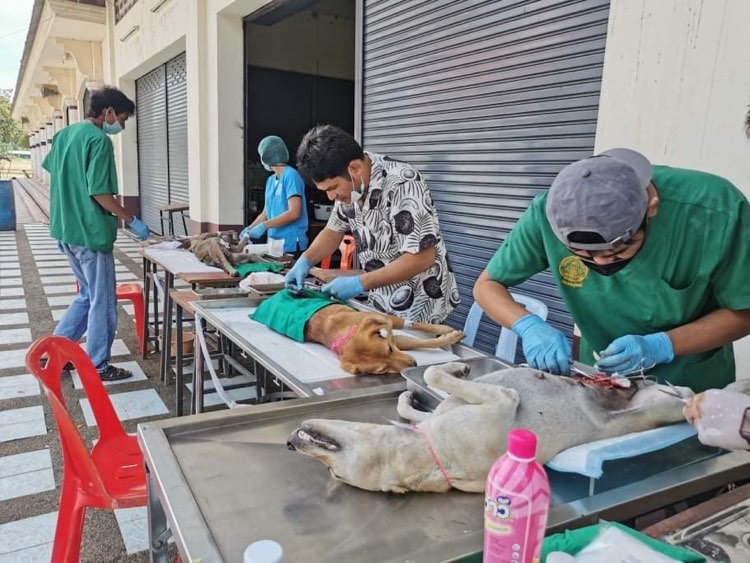
According to Jacob, the greatest challenge has been the sheer number of stray animals that exist in Thailand. “It’s a true epidemic,” he said. “Only through the sterilisation of these animals can we hope to reduce the size of the population.”
With each year, Rescue Paws has been able to establish more efficient ways of sterilising the stray population, multiplying their efforts. In 2021 alone, the foundation sterilised 1,357 animals. In the coming year, they hope to achieve 5,000 sterilisations.
“That being said, with big goals comes big costs. The second greatest challenge we face is raising the necessary funds,” Jacob continued. “Being an organisation that relies entirely upon donations, it can be difficult to raise funds for something that isn’t considered all that glamorous. However, it’s not just the sterilisations people are donating towards. We also treat a multitude of medical cases, from skin diseases, such as mange to broken limbs from traffic accidents.” On top of this, they run domestic and international adoption programmes as well as provide educational outreach and preventative healthcare such as vaccinations and parasite treatments.
“What we do is a lot, but it’s essential,” Jacob said. “Primarily, we raise funds through animal sponsorships, social media marketing, regular monthly donations and the application of international grants. Each year, the cost is greater, but so is our support. We have every faith that as we grow, so will our donor base.”
To donate or adopt, click here.
These top 5 barber shops in Bangkok are where gentlemen can elevate ...
Wandering around the globe, try out the signature tastes of cultures across ...
We asked Thai actresses and got real stars, fictional heroes and everything ...
Pets, as cherished members of our families, deserve rights and protections that ...
Sailorr and Molly Santana’s black grills fuse hip-hop swagger with homage to ...
VERY THAI: In this regular column, author Philip Cornwel-Smith explores popular culture and topics ...
Wee use cookies to deliver your best experience on our website. By using our website, you consent to our cookies in accordance with our cookies policy and privacy policy